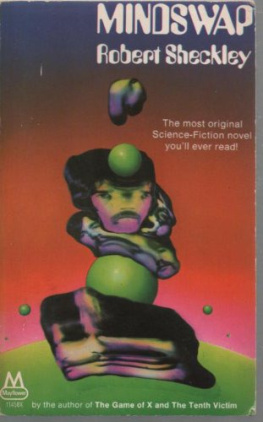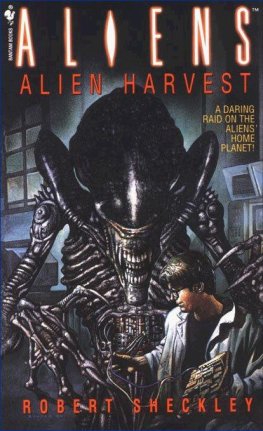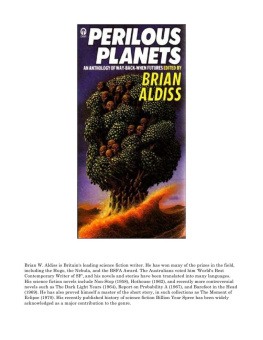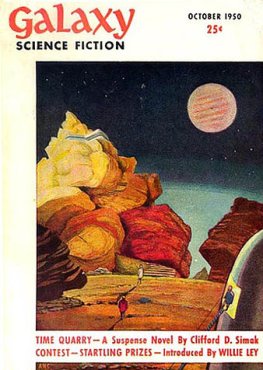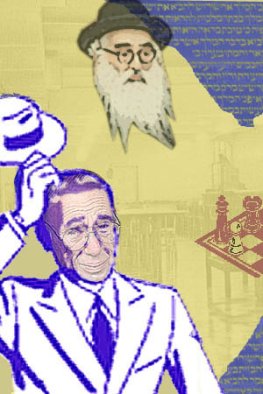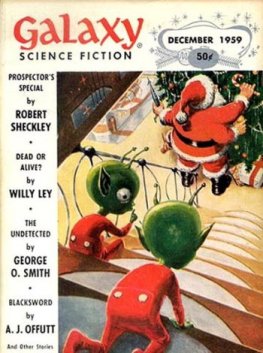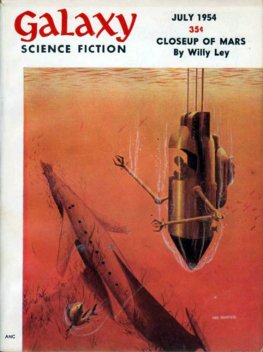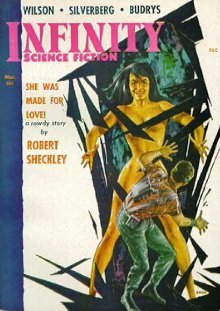MINDSWAP
ROBERT SHECKLEY
CHAPTER 1
Marvin Flynn read the following advertisement in the classified section of the Stanhope Gazette:
Gentleman from Mars, age 43, quiet, studious, cultured, wishes to exchange bodies with similarly inclined Earth gentleman. August 1 - September 1. References exchanged. Brokers protected.
This commonplace announcement was enough to set Flynn's pulse racing. To swap bodies with a Martian It was an exciting idea, but also a repellent one. After all, no one would want some sand-grubbing old Martian inside his head, moving his arms and legs, looking out of his eyes and listening with his ears. But in return for this unpleasantness, he, Marvin Flynn, would be able to see Mars. And he would be able to see it as it should be seen: through the senses of a native.
As some wish to collect paintings, others books, others women, so Marvin Flynn wanted to acquire the substance of them all through travel. But this, his ruling passion, was sadly unfulfilled. He had been born and raised in Stanhope, New York. Physically, his town was some three hundred miles from New York City. But spiritually and emotionally, the two cities were about a hundred years apart.
Stanhope was a pleasing rural community situated in the foothills of the Adirondacks, garlanded with orchards and dotted with clusters of brown cows against rolling green pastureland. Invincibly bucolic, Stanhope clung to antique ways; amiably, but with a hint of pugnacity. the town kept its distance from the flinthearted megalopolis to the south. The IRT - 7th Avenue subway had burrowed upstate as far as Kingston, but no farther. Gigantic freeways twisted their concrete tentacles over the countryside, but could not take over Stanhope's elm-lined Main Street. Other communities maintained a blast pit; Stanhope clung to its antiquated jet field and was content with triweekly service. (Often at night, Marvin had lain in bed and listened to that poignant sound of a vanishing rural America, the lonely wail of a jetliner.) Stanhope was satisfied with itself, and the rest of the world seemed quite satisfied with Stanhope and willing to leave it to its romantic dream of a less hurried age. The only person whom the arrangement did not suit was Marvin Flynn.
He had gone on the usual tours and had seen the usual things. Like everyone else, he had spent many weekends in the capitals of Europe. And he had explored the sunken city of Miami by scuba, gazed at the Hanging Gardens of London, and had worshipped in the Bahai temple in Haifa. For his longer vacations, he had gone on a walking tour across Marie Byrd Land, explored the lower Ituri Rain Forest, crossed Sinkiang by camel, and had even lived for several weeks in Lhassa, the art capital of the world. In all of this, his actions were typical of his age and station.
But these trips meant nothing to him; they were the usual tourist assortment, the sort of things that any casual vacationer was likely to do. Instead of rejoicing in what he had, Flynn complained of what was denied him. He wanted to really travel, and that meant going extraterrestrial.
It didn't seem so much to ask; and yet, he had never even been to the Moon.
In the final analysis, it was a matter of economics. Interstellar travel was expensive; for the most part, it was confined to the rich, or to colonists and administrators. It was simply out of the question for an average sort of fellow. Unless, of course, he wished to avail himself of the advantages of Mindswap.
Flynn, with innate small-town conservatism, had avoided this logical but unsettling step. Until now.
Marvin had tried to reconcile himself to his position in life, and to the very acceptable possibilities that that position offered him. After all, he was free, gay, and thirty-one (a little over thirty-one, actually). He was personable, a tall, broad-shouldered boy with a clipped black moustache and gentle brown eyes. He was healthy, intelligent, a good mixer, and not unacceptable to the other sex. He had received the usual education: grade school, high school, twelve years of college, and four years of postgraduate work. He was well trained for his job with the Reyck-Peters Corporation. There he fluoroscoped plastic toys, subjecting them to stress analysis and examining them for microshrinkage, porosity, texture fatigue, and the like. Perhaps it wasn't the most important job in the world; but then, we can't all be kings or spaceship pilots. It was certainly a responsible position, especially when one considers the importance of toys in this world, and the vital task of alleviating the frustrations of children.
Marvin knew all this; and yet, he was unsatisfied. In vain he had gone to his neighbourhood Counsellor. This kindly man had tried to help Marvin through Situation Factor Analysis, but Marvin had not responded with insight. He wanted to travel, he refused to look honestly at the hidden implications of that desire, and he would not accept any substitutes.
And now, reading that mundane yet thrilling advertisement similar to a thousand others yet unique in its particularity (since he was at the moment reading it), Marvin felt a strange sensation in his throat. To swap bodies with a Martian to see Mars, to visit the Burrow of the Sand King, to travel through the aural splendour of The Wound, to listen to the chromatic sands of the Great Dry Sea
He had dreamed before. But this time was different. That strange sensation in his throat argued a decision in the forming. Marvin wisely did not try to force it. Instead, he put on his beanie and went downtown to the Stanhope Pharmacy.
CHAPTER 2
As he had expected, his best friend, Billy Hake, was at the soda fountain, sitting on a stool and drinking a mild hallucinogen known as an LSD frapp.
'How's the morn, Sorn?' Hake asked, in the slang popular at that time.
'Soft and mazy, Esterhazy,' Marvin replied, giving the obligatory response.
'Du koomen ta de la klipje?' Billy asked. (Pidgin Spanish-Afrikaans dialect was the new laugh sensation that year.) 'Ja, Mijnheer,' Marvin answered, a little heavily. His heart simply was not in the clever repartee.
Billy caught the nuance of dissatisfaction. He raised a quizzical eyebrow, folded his copy of James Joyce Comics, popped a Keen-Smoke into his mouth, bit down to release the fragrant green vapour, and asked, 'For-why you burrow?' The question was wryly phrased but obviously well intended.
Marvin sat down beside Billy. Heavyhearted, yet unwilling to reveal his unhappiness to his lighthearted friend, he held up both hands and proceeded to speak in Plains Indian Sign Language. (Many intellectually inclined young men were still under the influence of last year's sensational Projectoscope production of Dakota Dialogue, starring Bjorn Rakradish as Crazy Horse and Milovar Slavovivowitz as Red Cloud, and done entirely in gesture.) Marvin made the gestures, mocking yet serious, for heart-that-breaks, horse-that-wanders, sun-that-will-not-shine, moon-that-cannot rise.
He was interrupted by Mr Bigelow, proprietor of the Stanhope Pharmacy. Mr Bigelow was a middle-aged man of seventy-four, slightly balding, with a small but evident paunch. Yet he affected boys' ways. Now he said to Marvin. 'Eh, Mijnheer, querenzie tomar la klopje inmensa de la cabeza vefrouvens in forma de ein skoboldash sundae?'
It was typical of Mr Bigelow and others of his generation to overdo the youthful slang, thus losing any comic effect except the pathetically unintentional.
'Schnell,' Marvin said, putting him down with the thoughtless cruelty of youth.
'Well, I never,' said Mr Bigelow, and moved huffily away with the mincing step he had learned from the Imitation of Life show.

